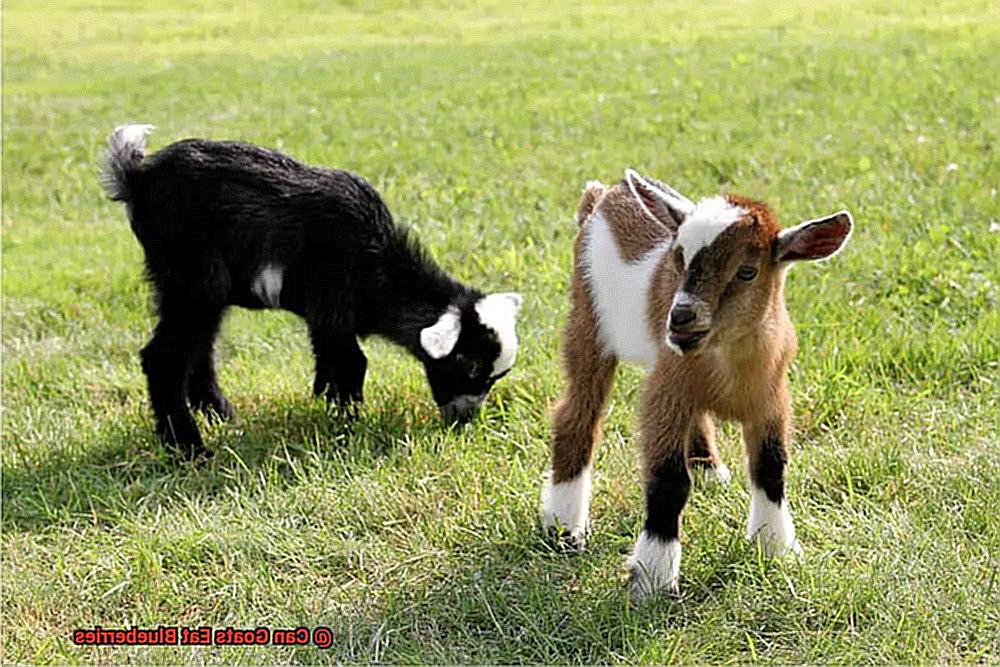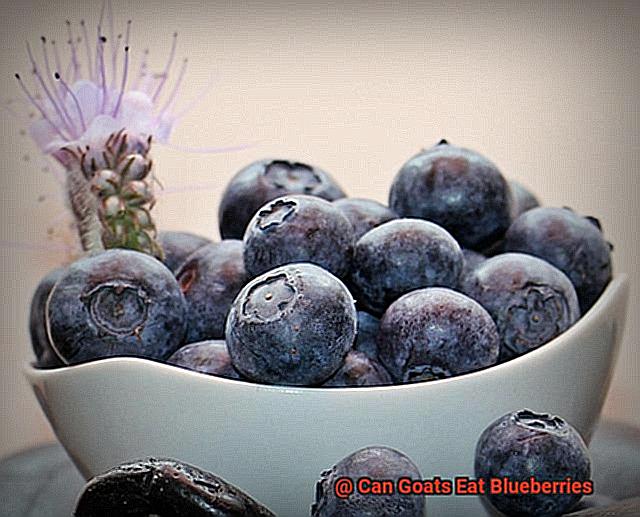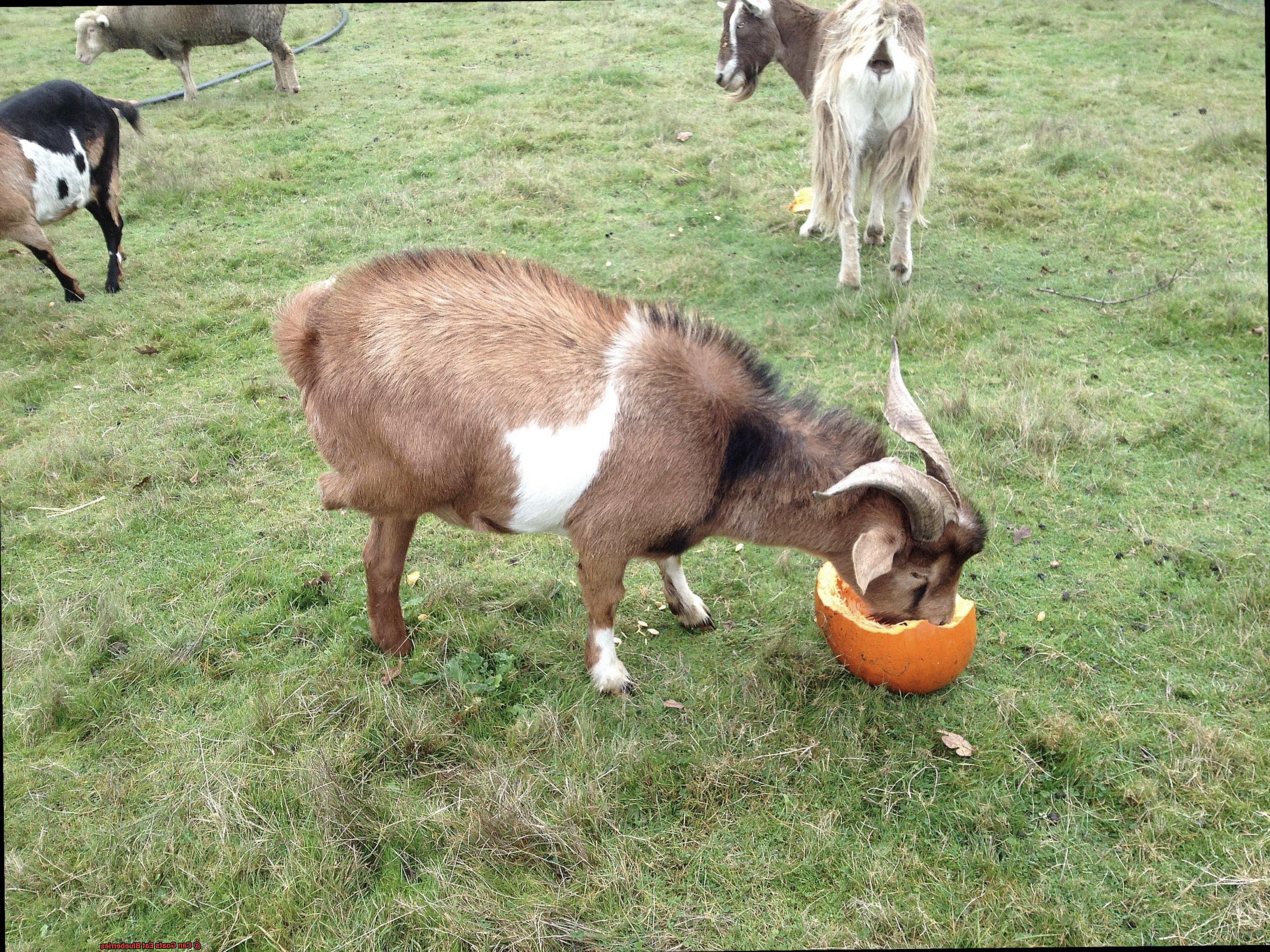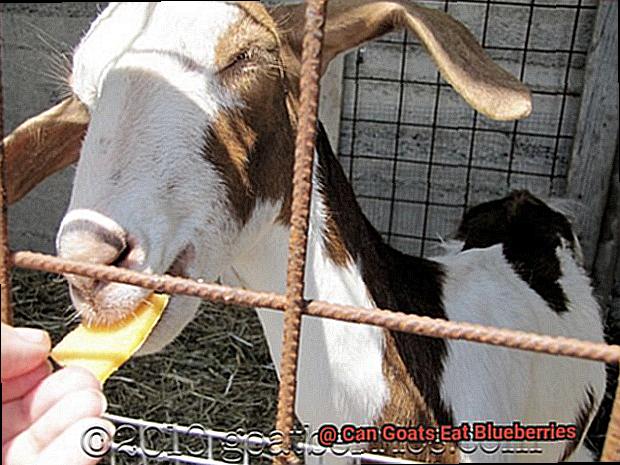Curiosity may have killed the cat, but for goats, it’s what keeps them grazing on interesting things. As a farmer or animal lover, you might have found yourself wondering if goats can eat blueberries. These curious creatures are known to enjoy munching on a variety of fruits, vegetables, and even some non-traditional foods.
Blueberries are often touted as a “superfood” due to their high antioxidant content and popularity among humans. But what about our goat friends? Are these little blue berries a safe and healthy snack for them?
Surprisingly, the answer is yes. Blueberries are actually an excellent addition to a goat’s diet as they are nutrient-dense, low in fat, and packed with vitamins A, C, and K. Plus, the natural sugars found in blueberries provide goats with the energy they need for running around and having fun.
But before you start feeding your goats blueberries by the handfuls, keep in mind that moderation is key. Overfeeding can lead to digestive issues and other health concerns. In this blog post, we’ll explore how much to feed your goats safely and delve into other fruits and vegetables that can be added to their diet.
So get ready to discover why goats can eat blueberries with gusto.
What are Blueberries?
Contents
Look no further than the mighty blueberry. These small, round berries are bursting with vitamins and antioxidants, making them a superfood for both humans and goats alike.

Blueberries are typically dark blue in color and are a staple in North American and European cuisine due to their sweet and tart taste. They are low in calories but high in fiber, vitamin C, vitamin K, potassium, magnesium, and calcium. Additionally, they contain anthocyanins, which are powerful antioxidants that safeguard the body from damage caused by free radicals.
While goats primarily graze on hay, grains, and grass, they can also consume fruits and vegetables as part of their well-balanced diet. Blueberries can be a healthy addition to their diet as they provide crucial nutrients. However, keep in mind that blueberries should not be the primary source of food for goats. Instead, they should only be given occasionally as a treat or supplement to their regular diet.
It is important to note that feeding too many blueberries or any other sugary treats can lead to stomach upset and diarrhea in goats. Therefore, it is recommended to introduce new foods gradually to goats to avoid any adverse reactions. Also, ensure that the blueberries given to goats are fresh and clean. Any moldy or spoiled berries should be discarded as they can be hazardous to goats.
In conclusion, blueberries are a delightful treat for your goats when given in moderation. They are brimming with vitamins and antioxidants that provide essential nutrients to your furry friends. So why not spoil your goats with some scrumptious blueberries today?
Nutritional Benefits of Eating Blueberries
Look no further than blueberries. These small berries are not only delicious but also packed with nutrients that can benefit goats in many ways.

Blueberries are low in fat and high in fiber, making them an excellent addition to a goat’s diet. But that’s not all – they are also rich in essential vitamins and minerals, such as vitamin C, vitamin K, and manganese. Vitamin C is essential for collagen synthesis, wound healing, and immune function. Vitamin K is necessary for blood clotting and bone health while manganese is essential for bone development and wound healing.
But the benefits don’t stop there. Blueberries also contain antioxidants such as anthocyanins that help prevent cellular damage caused by free radicals. These antioxidants can boost the immune system, reduce inflammation, and improve heart health.
It’s important to note that blueberries should not replace a balanced diet for goats but rather be given as a supplement or treat. Goats should always have access to fresh water when consuming blueberries.
In conclusion, feeding goats blueberries in moderation can provide them with beneficial nutrients that can enhance their overall health and well-being. So why not spoil your goats with some delicious blueberries?
Moderation is Key
While blueberries may seem like a tasty and nutritious treat to offer your goats, it is essential to remember that moderation is key.
While blueberries do have some essential vitamins and minerals, they should not make up a significant portion of your goat’s diet. Goats require a balanced diet consisting of hay or pasture, grains, and minerals. Blueberries should only be given as a treat or supplement in small amounts.
Feeding too many blueberries to goats can lead to digestive issues such as diarrhea or bloating. This is because blueberries contain high levels of sugar which can be harmful if consumed in excess. To avoid these issues, it is crucial to monitor the amount of blueberries given to goats and ensure that you do not exceed the recommended amounts.
It is also important to note that not all goats may enjoy the taste of blueberries. Some goats may refuse them altogether, while others may enjoy them as a treat. As with any new food introduced to a goat’s diet, it is best to start with small amounts and observe how they react before offering more.
In conclusion, while it is safe for goats to consume blueberries, it is crucial to do so in moderation as part of a balanced diet. It is always advisable to consult with a veterinarian or animal nutritionist before making any significant changes to your goat’s diet.
Feeding Blueberries to Goats
Sure, blueberries are packed with nutrients and are a tasty treat, but it’s important to remember that moderation is key when it comes to feeding them to your furry friends.
It’s vital to note that goats are ruminants, which means they require a diet high in fiber such as hay or grass. In contrast, blueberries are low in fiber and high in sugar. Overfeeding your goats blueberries may cause digestive issues such as bloating and diarrhea.
To avoid these problems, it’s best to feed your goats a handful of blueberries once or twice a week. This way, they’ll get the added nutrients and vitamins without overloading their digestive system.
Before feeding your goats any blueberries, be sure to wash them thoroughly and make sure they’re free from any harmful pesticides or chemicals. Goats can be picky eaters, so it may take some time for them to adjust to the taste of blueberries.
In conclusion, feeding blueberries to goats can be a healthy treat, but it should only be done in moderation. Remember that hay or grass should always be the primary source of food for your goats.
Potential Risks of Overfeeding Blueberries to Goats
You might think that feeding them sweet and juicy blueberries is a great way to achieve this, but overfeeding them can actually pose some significant risks to their health.

One of the main concerns is the high sugar content found in blueberries. While goats can consume small amounts of sugar in their diet, overfeeding them with sugary fruits like blueberries can lead to weight gain, obesity, and other health complications. So, it’s best to stick to a handful of blueberries once or twice a week after washing them thoroughly. Your goat will still enjoy this tasty snack without putting their health at risk.
Another risk associated with overfeeding blueberries to goats is the possibility of digestive issues such as diarrhea and bloating. Blueberries contain a significant amount of fiber, which is essential for maintaining a healthy digestive system. However, consuming too much fiber can cause digestive discomfort. It’s important to remember that goats have delicate digestive systems and should be given treats in moderation.
Moreover, blueberries have a low calcium to phosphorus ratio, which means that overfeeding them can lead to an imbalance of these minerals in a goat’s diet. This can result in the development of urinary calculi or kidney stones, which can be painful and even life-threatening for goats. To avoid such complications, ensure that your goat’s diet is well-balanced and includes all the necessary nutrients they need.
In summary, while blueberries are a healthy snack for goats when given in moderation, overfeeding them with blueberries or any other fruit should be avoided. As with any dietary changes, it is recommended to introduce new foods slowly and monitor your goat’s reaction to ensure they are tolerating it well. So next time you’re thinking of treating your goat with some blueberries, remember to do so in moderation and keep their health and well-being in mind.
yi9F446miQQ” >
Conclusion
In summary, goats can indeed enjoy the deliciousness of blueberries while reaping the benefits of their wholesome nutrients. These berries are rich in fiber, low in fat, and packed with essential vitamins and minerals that promote good health and well-being for your goats. However, it’s crucial to exercise caution when feeding them blueberries or any other fruit.
Overindulging on sugary treats like blueberries may lead to digestive issues such as bloating and diarrhea, which can be detrimental to your goat’s health. Additionally, too many blueberries can cause an imbalance of minerals in their diet, leading to urinary calculi or kidney stones.
To ensure a healthy balance in your goat’s diet, it’s essential to feed them blueberries or any other fruit in moderation while primarily providing them with hay or grass. Before making any significant changes to their diet, consult with a veterinarian or animal nutritionist for expert advice.
So why not treat your furry friends to some scrumptious blueberries today? Just remember to do so responsibly – with moderation being the key.






